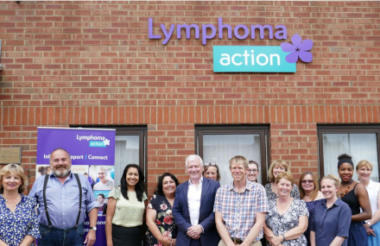Delivering vital services throughout the Covid-19 pandemic depended on making sure our team of 31 staff stayed healthy and well.
Our senior management team’s aim is always to make sure that our staff feel supported, involved and empowered, but this has been of particular importance throughout the events of the past year.
The wellbeing of our staff will continue to be our priority as we start to think about a return to the office, just as it has been from the outset of the pandemic.
Support during the pandemic
Fortunately, at the beginning of 2020 we invested in a suite of new laptops for staff that included video conferencing technology. That put us in a good position when it came to the infrastructure around remote working.
But as it became clear that home working would be the norm for the foreseeable future, we made sure that we listened to our team, to understand their individual circumstances and support a working pattern that worked for them and for the charity’s work.
We have also used a weekly email update from our senior team to inform staff about what has been happening across the organisation.
This has helped ensure that staff are aware of all of the resources available to them to support their wellbeing (including access to our Employee Assistance Programme and support from our Mental Health First Aider), as well as regular information about Covid-19 and vaccinations.
In the absence of informal chats during lunch breaks in the office, we scheduled regular staff social catch ups online, and encouraged the team to make the most of our staff WhatsApp group to send each other photos, jokes and best wishes to keep our spirits up.
Further practical measures of support included upgrading our telephones to a server-based system, so staff could receive calls directly to their laptops. The charity offered to pay for flu jabs where people weren’t eligible themselves.
Proud
We couldn’t be prouder of our team for what they have achieved during this time of uncertainty.
We have even accelerated areas of our online service delivery that have been in the discussion stage for some time.
However, it has to be said that there have been challenges for staff when working from home. As senior managers, we have kept the lines of communication open with our teams through regular group discussions, and from those we have heard how the blurred distinction between work and home life can be a challenge, compounded by the distractions and technical issues that working from home can bring.
What the future looks like
As we move out of lockdown, we have been developing those discussions in order to reflect on both the benefits and challenges of working from home and the office.
The first step has been to consult with staff via a survey about their thoughts on returning to the office. We were pleased to find that most people feel comfortable about coming back in time and suggested measures that would make this easier and more comfortable.
The majority of our staff have said that they would prefer a split between home and office working so, with this in mind, we have started to hone what hybrid working would look like for us.
Whilst on the whole, people do feel productive and effective working from home, we still need to acknowledge that some things are done better face to face and that remote working is not appealing or healthy for everyone.
So, as we move forward, we feel it is important to reflect on our learnings and strike a balance.
Measures in place
Our consultation with staff has highlighted a number of key themes that as a senior management team we need to keep in mind when people do return to the office.
Of course, a number of members of staff have not been into the office for over a year now, so even with a hybrid model in place, as an organisation we do have to be mindful that people need time to readjust to working in the office. This needs to be handled sensitively.
The next step for us, therefore, is to work with line managers and members of our ‘office procedures working group’ to work through these themes and identify priorities in order to plan a gradual return to the office.
The general feeling from our staff is that they will feel comfortable in the office if they are assured that others will keep to the guidelines we put in place. We are therefore looking into putting further practical measures to help people feel safe, in addition to those we have implemented for the small number of staff who have been working in the office when government guidelines allowed.
As well as the mirrors installed in our stairwells so people can prevent close contact with others coming up the stairs, keeping wipes and sanitisers in easy reach and continuing our increased cleaning provision, we will also look at keeping our communal areas closed, and keeping equipment and resources like thermometers and Covid testing kits on site.
These measures, in line with our risk assessments, and keeping an eye on local Covid-19 case numbers, should provide our staff with extra reassurance.
‘A hardline approach would be detrimental to staff’
We see our role as a senior management team as helping people over that first hurdle, working together with our teams to encourage them to start thinking about the benefits of returning to the office – even if it is just to see others, out of the confines of their homes.
Therefore, we will therefore continue to feedback to our staff via our group meetings and weekly updates as we move into the next stage of our planning.
As a medium-sized charity, with a small team, a hardline approach would actually be counterproductive, as this could lead to increased anxiety which would be detrimental to the wellbeing of our staff and the services we provide. For us, the key is to find a middle ground - considering what people feel both comfortable and uncomfortable with, and developing solutions that work for everyone, including ultimately the people that our charity is here to support.
Ropinder Gill is the chief executive of Lymphoma Action
Related news










